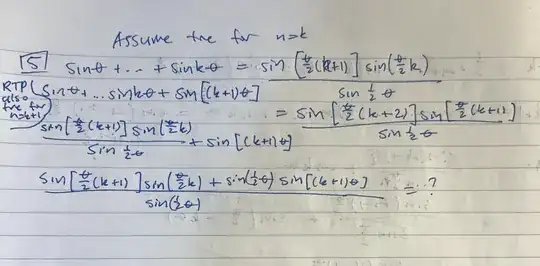Prove that $$\sin\theta+\sin2\theta+\sin3\theta+\cdots+\sin n\theta=\frac{\sin\frac{(n+1)\theta}2\sin\frac{n\theta}2}{\sin\frac\theta2},n\ge1,n\in\mathbb Z.$$
I have solved the base case $n = 1$ and prepared the assumption $n = k$. After I substitute the assumption into the induction step at $n = k+1$ I get lost, as I don't know how to successfully manipulate the numerator into the RHS. Any hints?
